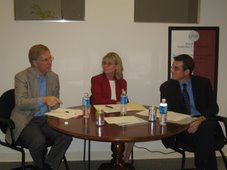“Ethics in government…isn’t that an oxymoron?” The triteness of that old chestnut aside, ethics in government should be ingrained in public management in the information age. Every public manager should be committed to the importance of ethics to the overall public sector. Every manager should care about the ethical dimensions of discretionary judgments made by our agencies’ leadership. Finally, public managers should make ethics an integral of their daily routine.” Here’s another one I’ve been hearing lately: “You’re teaching Ethics in Government?...it’ll be a short class!”
Public managers create value for citizens through the execution of public policy. This policy execution can be seen literally in the hundreds of decisions made daily by agency leaders and managers. But how are decisions made in your agency?
Does any of this sound familiar to you?:
- “What have we done before?” [an institutional approach]…
- “What can we afford to do now?” [a resource dependency model]...
- “What do our stakeholders/customers want us to do?” [the scorecard methodology]…
Now ask yourself where is the discussion of ethics in any of this? I suggest that ethical considerations are often not a conscious part of an Information Age leader’s decision-making.
Any discussion of ethics in the workplace tends to gravitate to one of two approaches. The first approach (let’s call it the “high road”) starts with a scholarly discussion of political philosophy with a dash of social equity theory and quotes from Aristotle. Ten minutes of this gets people yawning. The second (the “low road”) equates to our annual “Ethics Training” with a negative emphasis on strict adherence to formal rules.
It doesn’t take long for this to revert quickly to a debate about how to avoid the slammer. I propose a middle ground in which ethics are tied to public values. Information Age leadership in our democratic society must be exercised in the name of the people in accordance with the values on which our country was founded.
Where do we find our American public values? Two sources are the writings and speeches of our political leaders and Supreme Court decisions. But I suggest the best place to begin any discussion of ethics is the U. S. Constitution, the strongest source of our fundamental values. The seven original articles and 27 amendments have stood the test of time and continue to be our ethical core.
Every public sector leader and manager in the executive branch takes the following oath to uphold the Constitution and the values that it represents:
I, [name], do solemnly swear (or affirm) that I will support and defend the Constitution of the United States against all enemies, foreign and domestic; that I will bear true faith and allegiance to the same; that I take this obligation freely, without any mental reservation or purpose of evasion; and that I will well and faithfully discharge the duties of the office on which I am about to enter. So help me God. 5 U.S.C. §3331
The Constitution is the preeminent symbol of our public values, and the oath to uphold the Constitution is our commitment to uphold those values. If every public sector leader in the Information Age accepted this statement and made it a part of their professional life, “ethics in government” wouldn’t be a stale barb.
John L. O’Brien, a Lieutenant Colonel in the United States Air Force, teaches classes on performance management, process improvement, leadership, and ethics at the

